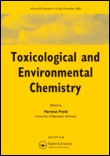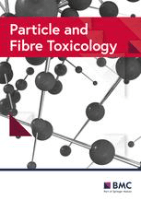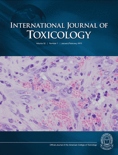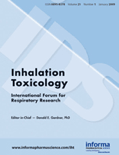
Frontiers in Toxicology
Scope & Guideline
Advancing the Science of Toxicology
Introduction
Aims and Scopes
- Chemical Safety and Risk Assessment:
The journal emphasizes research on the safety of chemicals, including pharmaceuticals, environmental pollutants, and food additives. It explores methodologies for assessing risk and establishing safety limits, with a focus on human health implications. - Innovative Toxicological Testing Methods:
Frontiers in Toxicology promotes the use of advanced testing methodologies, including in vitro, in silico, and high-throughput screening techniques, to evaluate the toxicological profiles of substances and to replace or reduce animal testing. - Mechanistic Insights into Toxicity:
Research published in the journal often delves into the molecular and cellular mechanisms underlying toxic effects, contributing to a better understanding of how various substances induce toxicity and the pathways involved. - Environmental Toxicology and Ecotoxicology:
The journal covers studies on the impact of environmental contaminants on ecosystems, highlighting the importance of understanding how pollutants affect wildlife and the environment, and their potential return to human populations. - Developmental and Reproductive Toxicology:
A significant focus area includes the effects of toxic substances on reproductive health and developmental processes, with research aimed at understanding the implications of exposures during critical developmental windows. - Emerging Contaminants and Public Health:
Frontiers in Toxicology addresses the growing concern over emerging contaminants, such as microplastics and per- and polyfluoroalkyl substances (PFAS), and their implications for public health, prompting discussions on regulatory frameworks.
Trending and Emerging
- In Vitro and In Silico Models:
There is a significant increase in the use of in vitro and in silico models for toxicity testing, underscoring a shift towards more humane and efficient methodologies that can provide rapid and reliable toxicological data. - Focus on Environmental and Chemical Exposures:
Research is increasingly directed towards understanding the impacts of environmental contaminants and chemical exposures on human health, particularly concerning pollutants like PFAS and microplastics, highlighting the need for regulatory attention. - Personalized Toxicology and Individual Susceptibility:
Emerging studies are exploring the role of genetic and environmental factors in individual susceptibility to toxic effects, paving the way for personalized approaches in toxicology and risk assessment. - Mechanistic Studies of Developmental Toxicity:
There is a growing emphasis on understanding the mechanisms of developmental toxicity, particularly in relation to endocrine disruptors and their long-term effects on health outcomes across generations. - Integrative Approaches to Risk Assessment:
The trend is shifting towards integrative risk assessment frameworks that combine data from various sources, including omics technologies, to provide a more comprehensive understanding of chemical toxicity.
Declining or Waning
- Traditional Animal Testing Models:
There is a noticeable decrease in research focused on traditional animal testing models, as the field increasingly embraces alternative methodologies that reduce animal use and improve predictive capabilities of toxicity assessments. - General Toxicology Studies without Specific Focus:
Papers that present broad toxicological findings without a specific angle or application are becoming less common. The trend is moving towards more targeted studies that address specific mechanisms or regulatory needs. - Lack of Integration with Computational Toxicology:
Research that does not incorporate computational toxicology methods is waning, as the field recognizes the importance of integrating computational approaches for better risk assessment and predictive modeling. - Single-Substance Toxicity Studies:
There appears to be a decline in the focus on single-substance toxicity studies, with a growing interest in understanding the effects of mixtures and cumulative exposures, reflecting the complexity of real-world exposure scenarios.
Similar Journals

BULLETIN OF ENVIRONMENTAL CONTAMINATION AND TOXICOLOGY
Unveiling the impacts of toxins on ecosystems and society.BULLETIN OF ENVIRONMENTAL CONTAMINATION AND TOXICOLOGY, published by SPRINGER, is a pivotal journal in the fields of Environmental Science, Toxicology, and Public Health. With a strong history of dissemination since its inception in 1966, the journal predominantly focuses on the latest advances in understanding environmental contaminants and their toxicological effects on health and ecosystems. It currently holds a respectable Q2 ranking across multiple categories including Health, Toxicology and Mutagenesis, Medicine (miscellaneous), and Pollution, as per the 2023 metrics. While the journal is not Open Access, it provides an invaluable platform for researchers, professionals, and students seeking to contribute to and stay informed on critical issues regarding environmental hazards and their implications. With an engaged community of scholars and practitioners, this journal continues to be an essential resource for addressing the pressing challenges of environmental contamination and its health impacts, guiding future research and policy decisions.

Toxics
Transforming toxicology insights into public health solutions.Toxics is a leading international journal published by MDPI that has been dedicated to advancing the knowledge in the fields of toxicology, environmental health, and chemical safety since its inception in 2013. With an impressive Open Access model, it ensures that all research findings are readily available to a global audience, fostering collaboration and innovation across academia and industry. The journal is esteemed for its rigorous peer-review process and holds notable rankings, including Q1 status in Chemical Health and Safety and Q2 in both Health, Toxicology and Mutagenesis and Toxicology, reflecting its impact on critical research areas. Based in Basel, Switzerland, Toxics provides a platform for researchers, professionals, and students to disseminate significant findings on the implications of toxic substances in health and the environment, aiming to improve public health outcomes and inform regulatory decisions. With its ongoing commitment to high-quality research and relevant access options, Toxics continues to be an essential resource in the domain of toxicology and environmental sciences.

Current Research in Toxicology
Connecting Theory and Practice in ToxicologyCurrent Research in Toxicology is a pioneering journal published by ELSEVIER that serves as a vital platform for disseminating cutting-edge research in the field of toxicology, spanning from biological impacts to pharmacological applications. With an ISSN of 2666-027X and an impressive Q2 ranking in key categories such as Applied Microbiology and Biotechnology, Health, Toxicology and Mutagenesis, and Toxicology, this journal underscores its commitment to high-quality research and significant contributions to the scientific community. Based in the Netherlands, Current Research in Toxicology aims to bridge the gap between academia and industry by providing rigorously peer-reviewed articles that cover a wide array of topics including novel methodologies, regulatory challenges, and emerging trends within the domain. The journal is accessible through various platforms, making it essential for researchers, professionals, and students eager to stay updated on the latest findings and advancements in toxicology. With a comprehensive focus on integrating theory with practical application, this journal is poised to influence future studies and policies in health and environmental science.

JOURNAL OF APPLIED TOXICOLOGY
Innovating Toxicology Research for a Safer TomorrowJOURNAL OF APPLIED TOXICOLOGY, published by Wiley, stands as a leading platform in the field of toxicology, focusing on the rigorous examination of chemical substances and their effects on biological systems. With an impressive Impact Factor, it ranks in the top quartile (Q2) for toxicology journals, reflecting its esteemed position within the scientific community. The journal, identifiable by its ISSN 0260-437X and E-ISSN 1099-1263, has been an invaluable resource since its inception in 1981, and it continues to serve as a conduit for innovative research and practical applications through 2024. Positioned at the forefront of the field, it garners recognition in the Scopus Rankings, where it ranks #31 out of 133 journals in the toxicology category, placing it in the 77th percentile—a testament to its contribution to the advancement of pharmacology and toxicological sciences. While not an open-access journal, it remains accessible to a wide audience of researchers, professionals, and students eager to explore cutting-edge findings in applied toxicology, making it a pivotal resource for enhancing knowledge and fostering collaboration in the field.

TOXICOLOGICAL AND ENVIRONMENTAL CHEMISTRY
Unraveling the complexities of chemicals and their environmental effects.TOXICOLOGICAL AND ENVIRONMENTAL CHEMISTRY is a pivotal journal published by Taylor & Francis Ltd, addressing critical intersections between environmental chemistry and toxicology since its inception in 1979. With its ISSN 0277-2248 and E-ISSN 1029-0486, the journal serves as a platform for rigorous research and innovative methodologies in pollution control, health implications of environmental chemicals, and the broader spectrum of toxicological studies. Although it currently does not offer open access, the journal's impact in the field is underscored by its Category Quartiles rankings in 2023, placing it in Q3 across Environmental Chemistry, Health, Toxicology and Mutagenesis, and Pollution categories. Furthermore, its Scopus rankings reveal its significant role within the scientific community, specifically in areas such as Environmental Science and Toxicology. The journal aspires to foster multidisciplinary dialogue and advance knowledge that contributes to environmental sustainability and public health, making it an essential resource for researchers, professionals, and students dedicated to these fields.

Particle and Fibre Toxicology
Unveiling the hidden dangers of particles and fibers.Particle and Fibre Toxicology is a leading open-access journal dedicated to advancing the field of toxicology, specifically focusing on the health impacts of particulate matter and fibers. Published by BMC since 2004, this journal operates from its offices in the United Kingdom and has gained significant recognition in the scientific community, achieving an impressive impact factor that highlights its relevance and influence. As indicated by its Q1 ranking in various categories including Health, Toxicology and Mutagenesis and Medicine (miscellaneous), it occupies a prestigious position in the academic landscape, appealing to researchers, professionals, and students alike. With a Scopus ranking of #4 in Toxicology and #7 in Environmental Science, the journal ensures high visibility and accessibility, providing a platform for the dissemination of key research findings and innovative methodologies in the interdisciplinary domains of toxicology. Through its commitment to open access, Particle and Fibre Toxicology fosters knowledge-sharing and collaboration, facilitating significant advancements in our understanding of the toxicological effects of environmental agents.

Toxicological Research
Elevating toxicological research to new heights of understanding.Toxicological Research is a prominent academic journal dedicated to advancing the field of toxicology through rigorous exploration and innovative research. Published by the Korean Society of Toxicology, this journal serves as a vital resource for researchers, professionals, and students engaged in environmental science, pharmacology, and toxicology. With an ISSN of 1976-8257 and an E-ISSN of 2234-2753, Toxicological Research highlights significant findings and discussions in the realm of health, toxicology, and mutagenesis. Although not an open-access journal, it maintains a solid reputation as evidenced by its Q3 ranking in both health-related toxicology and general toxicology categories for 2023. The journal covers a broad spectrum of topics from fundamental research to applied toxicology and provides a unique platform for the dissemination of knowledge in a field that is increasingly relevant in today’s society. With an anticipated convergence period from 2008 to 2024, Toxicological Research continues to contribute vital insights to understanding the implications of toxic substances on health and the environment.

INTERNATIONAL JOURNAL OF TOXICOLOGY
Advancing the Science of Toxicology for a Safer Tomorrow.The International Journal of Toxicology, published by SAGE Publications Inc, serves as a cornerstone of scholarly research in the field of toxicology, with an established history dating back to 1982. This esteemed journal, ISSN 1091-5818 and E-ISSN 1092-874X, functions within the Q3 quartile in Toxicology, ranking 94 out of 133 in the Pharmacology, Toxicology and Pharmaceutics category per Scopus metrics, reflecting its commitment to advancing scientific understanding in this critical area. The journal not only aims to disseminate high-quality research but also encourages open access to vital studies, thus fostering collaboration and innovation among researchers, professionals, and students alike. With a focus on various aspects of toxicology, including but not limited to environmental, clinical, and molecular toxicology, the International Journal of Toxicology is dedicated to bridging gaps in toxicity research and promoting safe practices across numerous disciplines. As it converges towards 2024, the journal continues to play a vital role in shaping the discourse surrounding the implications of exposure to toxic substances in human health and the environment.

Molecular & Cellular Toxicology
Pioneering research at the crossroads of toxicology and pharmacology.Molecular & Cellular Toxicology, published by the Korean Society Toxicogenomics & Toxicoproteomics (KSTT), is a significant journal in the field of toxicology, providing crucial insights into molecular mechanisms underlying toxic responses. With an ISSN of 1738-642X and E-ISSN 2092-8467, this journal serves as a vital platform for researchers, professionals, and students interested in the latest findings and advancements in toxicology, health, and environmental science. Although it operates under a subscription model, it maintains rigorous peer review standards, contributing to its respectable Q3 classification in Health, Toxicology and Mutagenesis, and its Q2 standing in Pharmacology, Toxicology, and Pharmaceutics. The journal, intersecting with innovative aspects of pharmacology and public health, aims to foster a deeper understanding of toxicological impacts on cellular processes and overall health. Located in Germany and supported by a dedicated editorial board, Molecular & Cellular Toxicology stands out in the academic community, encouraging interdisciplinary discourse and collaboration to address critical toxicological challenges. Engage with us for cutting-edge research that informs and shapes the future of toxicological science.

INHALATION TOXICOLOGY
Unraveling the Complexities of Inhalation Toxicology.Inhalation Toxicology, published by Taylor & Francis Ltd, is a premier journal dedicated to advancing the field of toxicology with a particular focus on inhalation exposure and its impact on human health. Established in 1989, this journal provides a vital platform for original research, reviews, and case studies that explore the toxicological effects of inhaled substances, making it essential reading for researchers, health professionals, and regulatory scientists. With an Impact Factor that situates it in the Q3 category in both Health, Toxicology and Mutagenesis, the journal asserts its relevance within the scientific community, particularly emphasizing its contributions as indexed by Scopus rankings in related fields. Although it follows a traditional access model, the journal's commitment to delivering high-quality research continues to foster significant discussions and advancements in understanding inhalation toxicology. For those at the forefront of environmental science and pharmacology, Inhalation Toxicology is an indispensable resource for both current research and future innovations in the discipline.